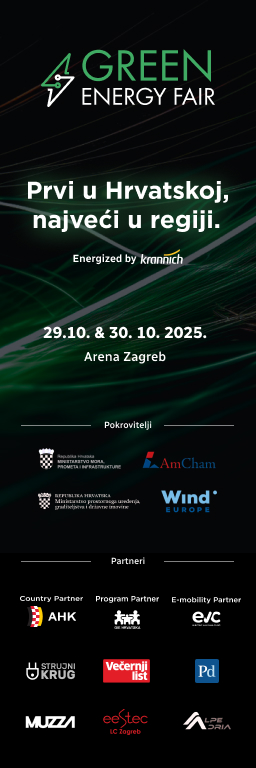A bureaucratic error by the state energy agency: Owners of biogas plants are preparing lawsuits against HERA.
They can return to the incentive system, but it will cost them between 300,000 and 700,000 euros, which they, of course, do not have. As a result, the owners of biogas plants are now preparing lawsuits. We’ll get into the specifics of those lawsuits later, but first, let’s recall the situation that biogas plant owners faced two summers ago, as reported by Večernji list.
The war in Ukraine led to a significant increase in the price of their primary raw material, corn silage, while the purchase price of electricity within the incentive system remained unchanged. Even then, biogas plants were operating at a loss, which only worsened after October 2022, when the European Union capped the price of megawatts at 180 euros. The European regulation excluded plants that produce electricity from biomethane, but not in Croatia, putting local biogas plants in a position where their “input” costs were up to three times higher than their “output” prices, making it financially unsustainable. Specifically, they were paying 300% more for silage, which is their raw material for electricity production, while their market revenue was capped by the state at 180 euros per megawatt. To clarify further, we’ll explain the incentive system in which virtually all renewable energy power plants operate.
Simply put, the Croatian Energy Market Operator (HROTE) purchases electricity from such power plants at a price lower than what it sells the electricity for, with the difference being covered by a surcharge for promoting renewable energy sources that we all pay through our monthly bills from HEP. The incentive system itself is not inherently bad, as the ultimate goal of Croatia, the European Union, and the world is to reduce the use of fossil fuels, which can be achieved by placing renewables in a somewhat privileged position.
However, when the price of electricity was capped at 180 euros per megawatt, some biogas plant operators decided that they could no longer remain in the incentive system due to the rising cost of raw materials, and they chose to terminate their contracts with the state and try their luck on the open market, where they could sell their electricity to whomever they wanted (not just HROTE) and at whatever price they wished. As time passed and the market stabilized globally, with the energy crisis easing, biogas plants wanted to rejoin the state system. Initially, this was not allowed, but later, just before the elections, they were permitted to re-enter, though only for the remaining period specified in the contract they had previously terminated.
In simpler terms, they can rejoin the incentive system, but only for the number of months remaining in the contract they broke when they left the system. However, there’s another catch. The biogas plant operators were asked to provide data to the Croatian Energy Regulatory Agency (HERA) to prove the increase in their production costs from December 2022 to June 2023, which led them to leave the incentive system in the first place. The key issue they are facing is having their higher production costs above 180 euros per megawatt recognized, so they submitted their data to HERA, but…
“HERA largely ignores the actual data from the producers’ business records and instead relies on reference values provided by HROTE. This approach is completely unfounded, as these reference values do not apply to any specific plant or the period in question. They are projections for twelve years and are used as a basis for determining reference values that HROTE uses when issuing tenders,” say the biogas plant operators. We asked Marijan Cenger, president of the Croatian Biogas Producers Association, to clarify the issue. He explained that people provided their data to HERA, but HERA created its methodology with its data. This may have been unintentional, due to a lack of understanding of how biogas plants operate, says Cenger, but these are the facts.
“And that’s where the calculations emerged, showing that plants, depending on their size, would have to pay between 300,000 and 700,000 euros to rejoin the incentive system. This money would go to the Environmental Protection Fund, but the biogas plant operators simply don’t have it, and they are preparing lawsuits against HERA. Specifically, imagine you ended 2023 with a profit of 200,000 euros, and now you have to pay 700,000 euros to the state. You’ve gone from being profitable to incurring a loss, which you have to explain to the Tax Administration, not to mention that almost all biogas plants have loans and had to adjust their status with the banks when they left the incentive system,” Cenger explains, adding that the Croatian Biogas Producers Association has already prepared a request for the Ministry of Economy, HERA, and HROTE, asking that biogas plants be allowed to pay the determined amounts through assignment.

We also asked HERA why, when calculating the costs that biogas plants must pay to rejoin the incentive system, they do not consider the business data provided by the biogas plant operators but instead base their calculations on HROTE’s reference values. We will publish their response as soon as it arrives.
We also requested a comment from the association representing renewable energy sources: Renewable Energy Sources Croatia (RESC).

“Producers of electricity in biogas plants are preparing lawsuits to challenge HERA’s decisions in which the actual production costs were ignored. Instead of actual costs, HERA used reference values that do not apply to the seven months covered by the legal price cap. By doing so, HERA is obstructing the efforts of the Government of the Republic of Croatia, which, by adopting the Regulation, protected consumers and found a solution to maintain production in technologies affected by the drastic increase in raw material prices,” said Maja Pokrovac, Managing director of RESC.
Mateja Šobak/Večernji list















